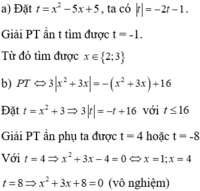
Hãy nhập câu hỏi của bạn vào đây, nếu là tài khoản VIP, bạn sẽ được ưu tiên trả lời.


Mình ko biết đặt biến phụ nên mình sẽ giải bừa :>
\(x^4+4x^3+6x^2+4x+1=0\)
\(\Leftrightarrow x^4+2x^3+x^2+2x^3+4x^2+2x+x^2+2x+1=0\)
\(\Leftrightarrow x^2\left(x^2+2x+1\right)+2x\left(x^2+2x+1\right)+\left(x^2+2x+1\right)=0\)
\(\Leftrightarrow\left(x^2+2x+1\right)\left(x^2+2x+1\right)=0\)
\(\Leftrightarrow\left(x+1\right)^4=0\Leftrightarrow x=-1\)
Thấy ngay x= 0 không phải là nghiệm của pt. Chia 2 vế của pt cho x2 ta được:
\(x^2+4x+6+4.\frac{1}{x}+\frac{1}{x^2}=0\)
\(\Leftrightarrow\left(x^2+\frac{1}{x^2}\right)+4\left(x+\frac{1}{x}\right)+6=0\left(1\right)\)
Đặt \(x+\frac{1}{x}=t\Rightarrow\left(x+\frac{1}{x}\right)^2=t^2\Rightarrow x^2+\frac{1}{x^2}=t^2-2\) Khi đó ta có:
\(\left(1\right)\Leftrightarrow t^2-2+4t+6=0\)
\(\Leftrightarrow t=-2\Leftrightarrow x+\frac{1}{x}=-2\Leftrightarrow x^2+2x+1=0\Leftrightarrow x=-1\)
Vậy pt có 1 nghiệm x = -1

Bài 1:
1.
\((x^2-6x)^2-2(x-3)^2+2=0\)
\(\Leftrightarrow (x^2-6x)^2-2(x^2-6x+9)+2=0\)
\(\Leftrightarrow (x^2-6x)^2-2(x^2-6x)-16=0\)
Đặt $x^2-6x=a$ thì pt trở thành:
$a^2-2a-16=0$
$\Leftrightarrow a=1\pm \sqrt{17}$
Nếu $a=1+\sqrt{17}$
$\Leftrightarrow x^2-6x=1+\sqrt{17}$
$\Leftrightarrow (x-3)^2=10+\sqrt{17}$
$\Rightarrow x=3\pm \sqrt{10+\sqrt{17}}$
Nếu $a=1-\sqrt{17}$
$\Rightarrow x=3\pm \sqrt{10-\sqrt{17}}$
Vậy.........
2.
$x^4-2x^3+x=2$
$\Leftrightarrow x^3(x-2)+(x-2)=0$
$\Leftrightarrow (x-2)(x^3+1)=0$
$\Leftrightarrow (x-2)(x+1)(x^2-x+1)=0$
Thấy rằng $x^2-x+1=(x-\frac{1}{2})^2+\frac{3}{4}>0$ nên $(x-2)(x+1)=0$
$\Rightarrow x=2$ hoặc $x=-1$
Vậy.......
Bài 2:
1.
ĐKXĐ: $x\neq 1$. Ta có:
\(x^2+(\frac{x}{x-1})^2=8\)
\(\Leftrightarrow x^2+(\frac{x}{x-1})^2+\frac{2x^2}{x-1}=8+\frac{2x^2}{x-1}\)
\(\Leftrightarrow (x+\frac{x}{x-1})^2=8+\frac{2x^2}{x-1}\)
\(\Leftrightarrow (\frac{x^2}{x-1})^2=8+\frac{2x^2}{x-1}\)
Đặt $\frac{x^2}{x-1}=a$ thì pt trở thành:
$a^2=8+2a$
$\Leftrightarrow (a-4)(a+2)=0$
Nếu $a=4\Leftrightarrow \frac{x^2}{x-1}=4$
$\Rightarrow x^2-4x+4=0\Leftrightarrow (x-2)^2=0\Rightarrow x=2$ (tm)
Nếu $a=-2\Leftrightarrow \frac{x^2}{x-1}=-2$
$x^2+2x-2=0\Rightarrow x=-1\pm \sqrt{3}$ (tm)
Vậy........
2. ĐKXĐ: $x\neq 0; 2$
$(\frac{x-1}{x})^2+(\frac{x-1}{x-2})^2=\frac{40}{49}$
$\Leftrightarrow (\frac{x-1}{x}+\frac{x-1}{x-2})^2-\frac{2(x-1)^2}{x(x-2)}=\frac{40}{49}$
$\Leftrightarrow 4\left[\frac{(x-1)^2}{x(x-2)}\right]^2-\frac{2(x-1)^2}{x(x-2)}=\frac{40}{49}$
Đặt $\frac{(x-1)^2}{x(x-2)}=a$ thì pt trở thành:
$4a^2-2a=\frac{40}{49}$
$\Rightarrow 2a^2-a-\frac{20}{49}=0$
$\Rightarrow a=\frac{7\pm \sqrt{209}}{28}$
$\Leftrightarrow 1+\frac{1}{x(x-2)}=\frac{7\pm \sqrt{209}}{28}$
$\Leftrightarrow \frac{1}{x(x-2)}=\frac{-21\pm \sqrt{209}}{28}$
$\Rightarrow x(x-2)=\frac{28}{-21\pm \sqrt{209}}$
$\Rightarrow (x-1)^2=\frac{7\pm \sqrt{209}}{-21\pm \sqrt{209}}$.
Dễ thấy $\frac{7+\sqrt{209}}{-21+\sqrt{209}}< 0$ nên vô lý
Do đó $(x-1)^2=\frac{7-\sqrt{209}}{-21-\sqrt{209}}$
$\Leftrightarrow x=1\pm \sqrt{\frac{7-\sqrt{209}}{-21-\sqrt{209}}}$
Vậy........

Mình nghĩ đề câu a là: \(x+\sqrt{5}+\sqrt{x}-1=-6\)
Đặt \(\sqrt{x}=t\Rightarrow t^2=x\)
\(Ta\)\(được\): \(t^2+\sqrt{5}+t-1=-6\)
\(\Leftrightarrow t^2-5+t+\sqrt{5}=0\)
\(\Leftrightarrow\left(t-\sqrt{5}\right).\left(t+\sqrt{5}\right)+\left(t+\sqrt{5}\right)=0\)
\(\Leftrightarrow\left(t+\sqrt{5}\right).\left(t-\sqrt{5}+1\right)=0\)
\(\Rightarrow\hept{\begin{cases}t=-\sqrt{5}\\t=\sqrt{5}-1\end{cases}}\)
\(\Rightarrow\hept{\begin{cases}x=5\\x=6-2\sqrt{5}\end{cases}}\)

Bài 1 :
Mình nghĩ phải sửa đề ntn :
\(4\left(2x+7\right)^2-9\left(x+3\right)^2=0\)
\(\Leftrightarrow\left[2\left(2x+7\right)\right]^2-\left[3\left(x+3\right)\right]^2=0\)
\(\Leftrightarrow\left[2\left(2x+7\right)-3\left(x+3\right)\right]\left[2\left(2x+7\right)+3\left(x+3\right)\right]=0\)
\(\Leftrightarrow\left(4x+14-3x-9\right)\left(4x+14+3x+9\right)=0\)
\(\Leftrightarrow\left(x+5\right)\left(7x+23\right)=0\)
\(\Leftrightarrow\orbr{\begin{cases}x+5=0\\7x+23=0\end{cases}\Leftrightarrow\orbr{\begin{cases}x=-5\\x=\frac{-23}{7}\end{cases}}}\)
Vậy....
b) \(A=\left(x^2+x+1\right)\left(x^2+x+2\right)-12\)
Đặt \(q=x^2+x+1\)ta có :
\(A=q\left(q+1\right)-12\)
\(A=q^2+q-12\)
\(A=q^2+4q-3q-12\)
\(A=q\left(q+4\right)-3\left(q+4\right)\)
\(A=\left(q+4\right)\left(q-3\right)\)
Thay \(q=x^2+x+1\)ta có :
\(A=\left(x^2+x+1+4\right)\left(x^2+x+1-3\right)\)
\(A=\left(x^2+x+5\right)\left(x^2+x-2\right)\)
\(A=\left(x^2+x+5\right)\left(x^2+2x-x-2\right)\)
\(A=\left(x^2+x+5\right)\left[x\left(x+2\right)-\left(x+2\right)\right]\)
\(A=\left(x^2+x+5\right)\left(x+2\right)\left(x-1\right)\)

2/ (x2 + x + 1) (x2+ x + 2) = 12
đặt x2 + x = t
thay vào đc:
(t + 1) (t + 2) = 12
<=> t2 + 3t + 2 = 12
<=> t2 + 3t - 10 = 0
<=> t2 - 2t + 5t - 10 = 0
<=> t (t - 2) + 5 (t - 2) = 0
<=> (t + 5) (t - 2) = 0
=> {
t=−5 |
t=2 |
thay t đc:
*) x2 + x = -5 => x loại
*) x2 + x = 2 = x2 + x - 2 = x2 - 1 + x - 1 = (x - 1) (x + 1) + (x - 1) = (x - 1) (x + 2)
=> x = 1 hoặc x = - 2
S = {-2 ; 1}
3/ (x2 - 6x + 4)2 - 15(x2 - 6x + 10) = 1
đặt x2 - 6x + 4 = t
có: t2 - 15(t + 6) = 1
<=> t2 - 15t - 91 = 0
Câu 2 đặt ẩn phụ là x^2+x+2= a là đc
Câu 3 đặt ẩnphụ là x^2-6x+4= b là đc

\(\left(x^2+x\right)^2+4\left(x^2+x\right)=12\)
đặt \(\left(x^2+x\right)=t\) ta có
\(t^2+4t-12=0\)
\(\Leftrightarrow t^2+6t-2t-12=0\)
\(\Leftrightarrow t\left(t+6\right)-2\left(t+6\right)=0\)
\(\Leftrightarrow\left(t-2\right)\left(t+6\right)=0\)
\(\Leftrightarrow\orbr{\begin{cases}t-2=0\\t+6=0\end{cases}}\Leftrightarrow\orbr{\begin{cases}t=2\\t=-6\end{cases}}\)
khi đó giả lại biến \(\left(x^2+x\right)\) rồi làm như bình thường

1/ Đặt \(a=x^3-x^2\left(a\ne0\right)\), khi đó phương trình đề cho trở thành \(a-\frac{8}{a}=2\Leftrightarrow a^2-2a-8=0\Leftrightarrow\left(a-4\right)\left(a+2\right)=0\)
\(\Leftrightarrow\left[{}\begin{matrix}a-4=0\\a+2=0\end{matrix}\right.\Leftrightarrow\left[{}\begin{matrix}a=4\\a=-2\end{matrix}\right.\)\(\Rightarrow\left[{}\begin{matrix}x^3-x^2=4\\x^3-x^2=-2\end{matrix}\right.\Leftrightarrow\left[{}\begin{matrix}\left(x-2\right)\left(x^2+x+2\right)=0\\\left(x+1\right)\left(x^2-2x+2\right)=0\end{matrix}\right.\)\(\Leftrightarrow\left[{}\begin{matrix}\left(x-2\right)\left[\left(x+\frac{1}{2}\right)^2+\frac{7}{4}\right]=0\\\left(x+1\right)\left[\left(x-1\right)^2+1\right]=0\end{matrix}\right.\)
\(\Leftrightarrow\left[{}\begin{matrix}x-2=0\\x+1=0\end{matrix}\right.\Leftrightarrow\left[{}\begin{matrix}x=2\\x=-1\end{matrix}\right.\)
KL: .................
b/ Tương tự đặt \(\frac{x^2+x-5}{x}=b\left(x\ne0\right)\) phương trình trở thành \(b+\frac{1}{3b}+4=0\)
c/ Tương tự đặt \(c=x^2-x\left(c\ne-1,2\right)\) phương trình trở thành \(\frac{c}{c-1}-\frac{c+2}{c-2}=1\)
d/ Tương tự đặt \(d=4x+\frac{7}{x}\). Chia cả tử và mẫu của 2 phân thức cho $x$ phương trình trở thành \(\frac{4}{d-8}+\frac{3}{d-10}=1\)
e/ Tương tự đặt \(e=x+\frac{1}{x}\), phương trình trở thành \(8\left(e^2-2\right)-34e+51=0\)
f) Xét $y=0$ Thay ..............
Xét $y \ne 0$ Phân tích VT phương trình thành nhân tử, phương trình trở thành \(\left(y^2+y+1\right)\left(y^2+4y+1\right)=0\) chia cả 2 vế của phương trình với $y^2$ phương trình tương đương\(\left(y+\frac{1}{y}+1\right)\left(y+\frac{1}{y}+4\right)=0\)
Đặt \(t=y+\frac{1}{y}\), phương trình trở thành \(\left(t+1\right)\left(t+4\right)=0\)
---------------
Đây là phần hướng dẫn làm bài theo hướng đặt ẩn phụ của mình, ngoài ra còn các cách giải khác bạn nhé!

\(\Leftrightarrow4\left|x-2\right|=\left(x-2\right)^2+4\)
Đặt \(\left|x-2\right|=t\ge0\)
\(\Rightarrow4t=t^2+4\Rightarrow t^2-4t+4=0\)
\(\Rightarrow\left(t-2\right)^2=0\Rightarrow t=2\)
\(\Rightarrow\left|x-2\right|=2\Rightarrow\left[{}\begin{matrix}x-2=2\\x-2=-2\end{matrix}\right.\)
\(\Rightarrow\left[{}\begin{matrix}x=4\\x=0\end{matrix}\right.\)